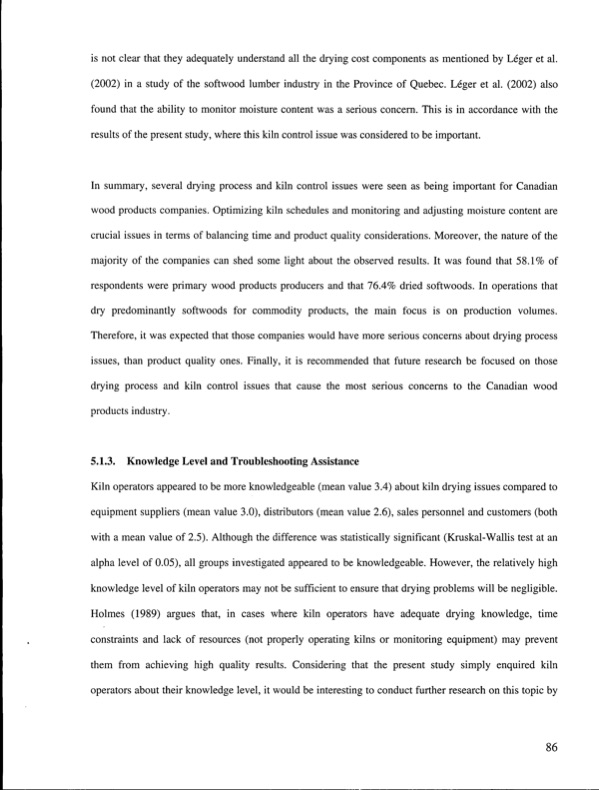
PDF Publication Title:
Text from PDF Page: 095
is not clear that they adequately understand all the drying cost components as mentioned by Leger et al. (2002) in a study of the softwood lumber industry in the Province of Quebec. Leger et al. (2002) also found that the ability to monitor moisture content was a serious concern. This is in accordance with the results of the present study, where this kiln control issue was considered to be important. In summary, several drying process and kiln control issues were seen as being important for Canadian wood products companies. Optimizing kiln schedules and monitoring and adjusting moisture content are crucial issues in terms of balancing time and product quality considerations. Moreover, the nature of the majority of the companies can shed some light about the observed results. It was found that 58.1% of respondents were primary wood products producers and that 76.4% dried softwoods. In operations that dry predominantly softwoods for commodity products, the main focus is on production volumes. Therefore, it was expected that those companies would have more serious concerns about drying process issues, than product quality ones. Finally, it is recommended that future research be focused on those drying process and kiln control issues that cause the most serious concerns to the Canadian wood products industry. 5.1.3. Knowledge Level and Troubleshooting Assistance Kiln operators appeared to be more knowledgeable (mean value 3.4) about kiln drying issues compared to equipment suppliers (mean value 3.0), distributors (mean value 2.6), sales personnel and customers (both with a mean value of 2.5). Although the difference was statistically significant (Kruskal-Wallis test at an alpha level of 0.05), all groups investigated appeared to be knowledgeable. However, the relatively high knowledge level of kiln operators may not be sufficient to ensure that drying problems will be negligible. Holmes (1989) argues that, in cases where kiln operators have adequate drying knowledge, time constraints and lack of resources (not properly operating kilns or monitoring equipment) may prevent them from achieving high quality results. Considering that the present study simply enquired kiln operators about their knowledge level, it would be interesting to conduct further research on this topic by 86PDF Image | KILN DRYING PROBLEMS AND ISSUES IN CANADA

PDF Search Title:
KILN DRYING PROBLEMS AND ISSUES IN CANADAOriginal File Name Searched:
ubc_2004-0049.pdfDIY PDF Search: Google It | Yahoo | Bing
5,000 BF Shipping Container Lumber Dry Kiln For Quality Lumber The 5,000 BF container kiln consists of one 40 foot high-cube aluminum shipping container... More Info
Shipping Container Lumber Dry Kilns by Global Energy Global Energy designed and developed the container kiln back in 1991. The purpose is to give access to portable sawmill owners, furniture makers, and small business the value added profit of dry kiln lumber and quality hardwoods... More Info
Vacuum Kiln Conversion Kit for Lumber and Wood Dry Kilns Convert your existing conventional dry kiln into a fast drying vacuum kiln. Similar to vacuum bagging in the boat building and aircraft industry, we have come up with a proprietary process which allows you to build a very simple vacuum kiln at a fraction of the price, and without the intensive conventional metal chamber structure... More Info
Vacuum Pump Cart System for Bagging Clamping Wood Drying and more Vacuum Cart with 2HP Pump and Dual Pistons with multiple multiplex vacuum ports and liquid reservoir... More Info
Vacuum Bagging Basics Vacuum bagging is a method of clamping, which has traditionally been used in the composites industry, but can also be used for vacuum drying materials, including wood products... More Info
| CONTACT TEL: 608-238-6001 Email: greg@globalmicroturbine.com | RSS | AMP |